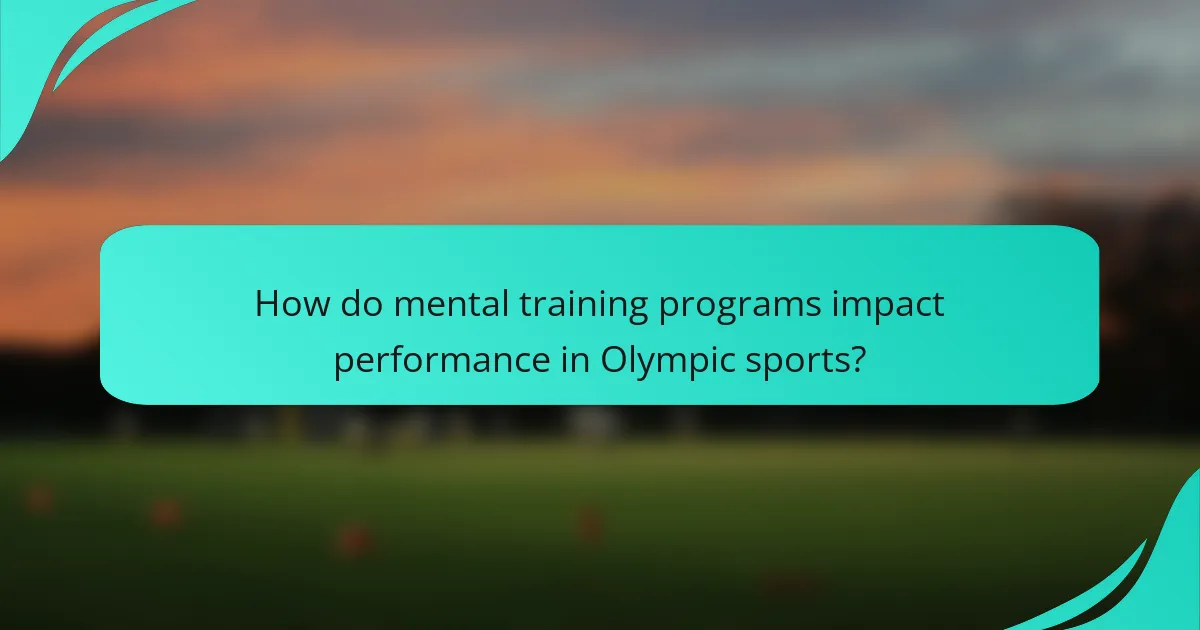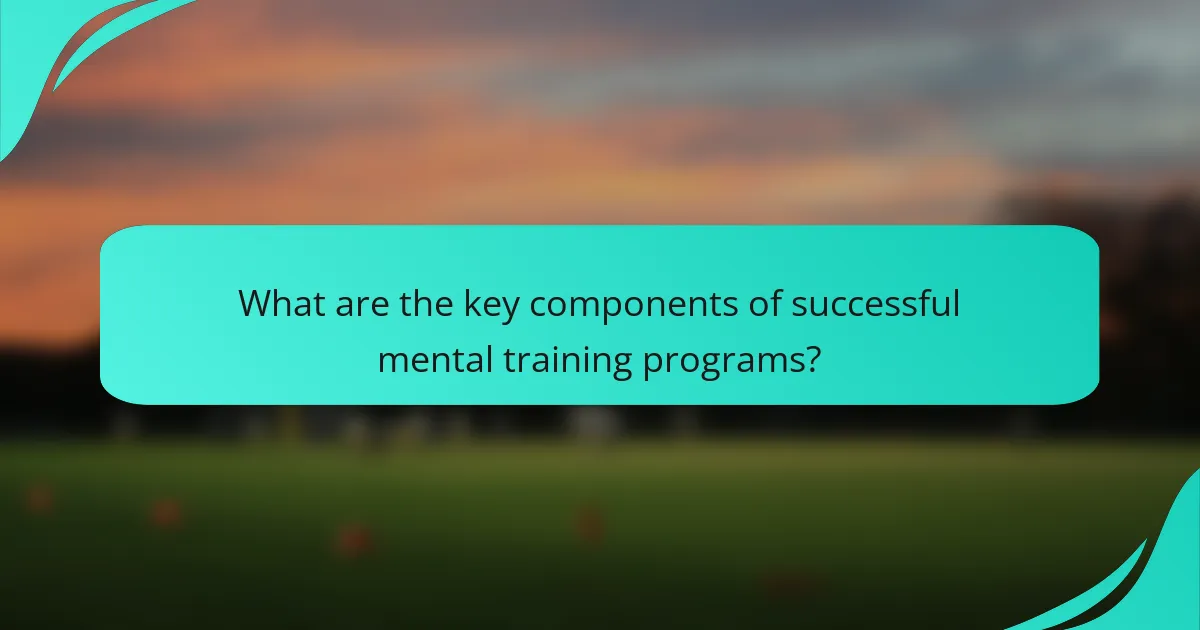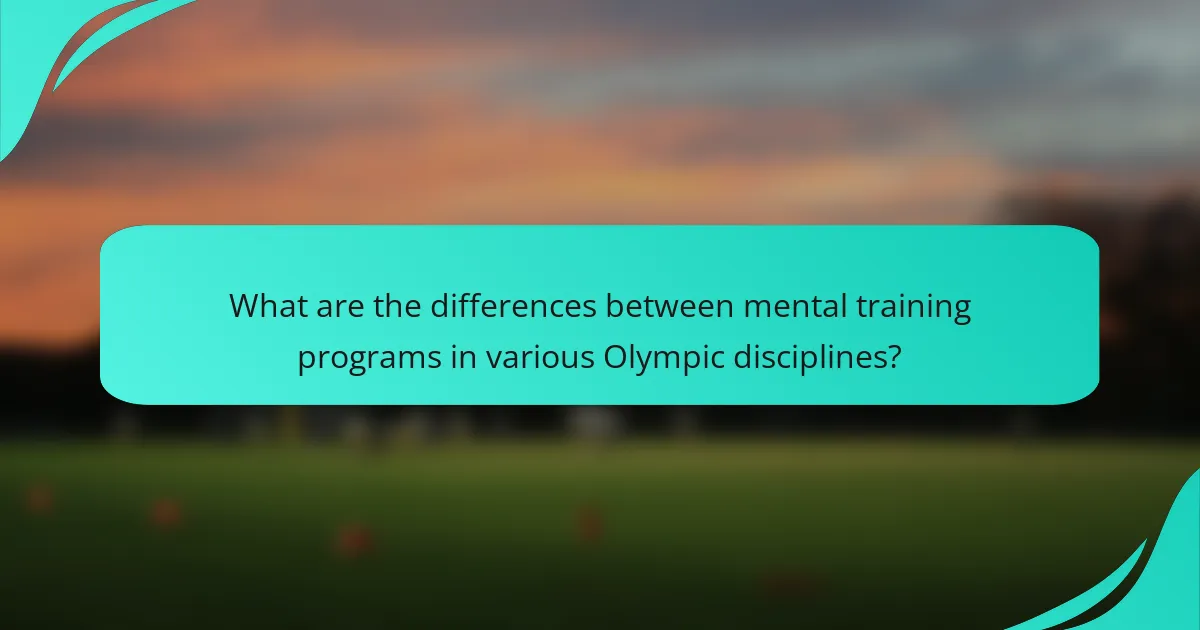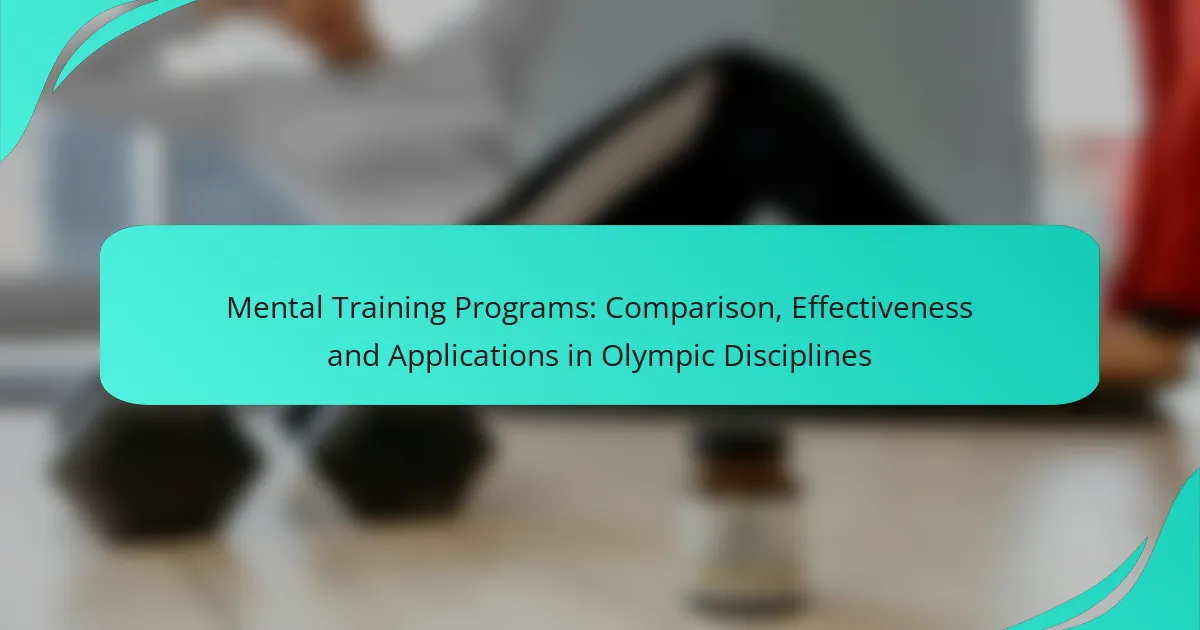Mental training programs play a crucial role in enhancing the performance of Olympic athletes by employing various psychological techniques. By focusing on skills such as mindfulness, visualization, and emotional control, these programs help athletes develop the mental resilience necessary to thrive in high-pressure environments. Tailored to individual needs, effective mental training includes goal setting and regular practice, ultimately leading to improved cognitive functions and overall performance in their respective sports.

What are the most effective mental training programs for Olympic athletes?
The most effective mental training programs for Olympic athletes focus on enhancing performance through psychological techniques. These programs include mindfulness practices, cognitive behavioral strategies, visualization, biofeedback, and neurofeedback, each offering unique benefits tailored to athletes’ needs.
Mindfulness-Based Stress Reduction
Mindfulness-Based Stress Reduction (MBSR) helps athletes manage stress and improve focus by promoting present-moment awareness. This technique often involves meditation and breathing exercises, allowing athletes to remain calm under pressure.
To implement MBSR, athletes can practice daily mindfulness meditation for 10-20 minutes, gradually increasing the duration. Regular practice can lead to improved emotional regulation and enhanced concentration during competitions.
Cognitive Behavioral Techniques
Cognitive Behavioral Techniques (CBT) focus on identifying and changing negative thought patterns that can hinder performance. By addressing these cognitive distortions, athletes can develop a more positive mindset and improve their self-confidence.
Common CBT strategies include setting realistic goals, challenging negative beliefs, and using positive affirmations. Athletes should consider working with a sports psychologist to tailor these techniques to their specific challenges.
Visualization and Imagery Training
Visualization and imagery training involve mentally rehearsing athletic performance to enhance skills and confidence. Athletes visualize themselves executing techniques successfully, which can improve muscle memory and reduce anxiety.
To practice effectively, athletes should spend 5-15 minutes daily visualizing their performance in vivid detail, including sights, sounds, and feelings. This technique can be particularly beneficial before competitions to boost mental readiness.
Biofeedback Training
Biofeedback training provides athletes with real-time data about physiological functions, such as heart rate and muscle tension. By learning to control these responses, athletes can enhance their performance and manage stress levels more effectively.
Sessions typically involve using sensors connected to a computer that displays physiological data. Athletes can practice techniques to lower heart rates or reduce tension, which can be particularly useful during high-pressure situations.
Neurofeedback Programs
Neurofeedback programs train athletes to regulate brain activity, promoting optimal mental states for performance. This technique uses EEG technology to provide feedback on brainwave patterns, helping athletes learn to achieve desired mental states.
Sessions usually last 30-60 minutes and can be conducted weekly. Athletes may notice improvements in focus, relaxation, and overall mental clarity, making neurofeedback a valuable tool for enhancing competitive performance.

How do mental training programs impact performance in Olympic sports?
Mental training programs significantly enhance performance in Olympic sports by developing athletes’ psychological skills. These programs focus on improving cognitive functions, emotional control, and overall mental resilience, which are crucial for success in high-pressure environments.
Improved Focus and Concentration
Mental training enhances an athlete’s ability to maintain focus and concentration during competitions. Techniques such as visualization and mindfulness help athletes block out distractions, allowing them to concentrate on their performance. For instance, a sprinter may use visualization to mentally rehearse their race, leading to improved execution on the track.
To cultivate focus, athletes can practice setting specific goals for each training session, which helps sharpen their attention on critical aspects of their performance. Regular practice of concentration exercises can yield noticeable improvements in competitive settings.
Enhanced Emotional Regulation
Effective mental training equips athletes with strategies to manage their emotions, particularly in high-stress situations. Techniques like breathing exercises and cognitive restructuring enable athletes to remain calm and composed, reducing the impact of anxiety or frustration during competitions.
For example, a gymnast facing a challenging routine may use deep breathing to calm nerves before performing. Developing emotional regulation skills can lead to more consistent performances, as athletes learn to control their emotional responses to both successes and setbacks.
Increased Confidence and Motivation
Mental training programs foster greater self-confidence and intrinsic motivation among athletes. By setting achievable goals and celebrating small victories, athletes can build a positive self-image and a strong belief in their abilities. This confidence translates into better performance during competitions.
Practicing positive self-talk and visualization of success can further enhance motivation. Athletes should regularly remind themselves of their achievements and visualize their goals to maintain a high level of motivation throughout their training and competition cycles.
Better Stress Management
Stress management is a critical component of mental training that helps athletes cope with the pressures of competition. Techniques such as mindfulness meditation and progressive muscle relaxation can reduce stress levels, allowing athletes to perform at their best when it matters most.
To effectively manage stress, athletes should develop a routine that includes regular mental training sessions focused on relaxation techniques. This practice can help them enter competitions with a calm and focused mindset, ultimately improving their performance outcomes.

What are the key components of successful mental training programs?
Successful mental training programs typically include goal setting, regular practice, and personalized training plans. These components work together to enhance an athlete’s mental resilience, focus, and overall performance in Olympic disciplines.
Goal Setting Techniques
Goal setting techniques are essential for creating a clear direction in mental training programs. Athletes should establish specific, measurable, achievable, relevant, and time-bound (SMART) goals to track their progress effectively. For instance, instead of a vague goal like “improve focus,” a more precise goal would be “practice visualization techniques for 10 minutes daily over the next month.”
Regularly reviewing and adjusting these goals can help maintain motivation and ensure they remain aligned with the athlete’s evolving needs. Setting both short-term and long-term goals can provide a balanced approach, allowing athletes to celebrate small victories while keeping their eyes on larger objectives.
Regular Practice and Consistency
Regular practice and consistency are crucial for the effectiveness of mental training programs. Athletes should integrate mental training exercises into their daily routines, dedicating time to practice techniques such as visualization, mindfulness, or breathing exercises. Consistency helps reinforce these skills, making them more effective during competition.
Establishing a routine that includes mental training alongside physical training can lead to improved performance. For example, athletes might allocate 15-20 minutes after their physical workouts to focus on mental skills, ensuring that both aspects of their training are balanced and complementary.
Personalized Training Plans
Personalized training plans are vital for addressing the unique needs of each athlete. These plans should consider individual strengths, weaknesses, and specific challenges faced in their sport. For example, a swimmer might focus on overcoming anxiety before races, while a gymnast may work on building confidence during routines.
Collaboration with a sports psychologist or mental coach can help tailor these plans effectively. Regular assessments and feedback sessions can ensure that the training remains relevant and effective, allowing athletes to adapt their strategies as they progress in their mental training journey.

What are the differences between mental training programs in various Olympic disciplines?
Mental training programs vary significantly across Olympic disciplines, tailored to the unique demands of each sport. These programs focus on enhancing mental resilience, concentration, and performance under pressure, with specific techniques suited to team dynamics, individual challenges, and the nature of physical exertion involved.
Team Sports vs. Individual Sports
In team sports, mental training emphasizes communication, cohesion, and collective strategy. Athletes often engage in exercises that build trust and enhance team dynamics, such as group visualization and role-playing scenarios. This approach helps athletes adapt to the fluid nature of team play and fosters a unified mindset.
Conversely, individual sports focus on self-regulation, personal goal-setting, and mental toughness. Techniques like self-talk, visualization, and mindfulness are commonly employed to help athletes manage their thoughts and emotions during competition. Individual athletes often need to cultivate a strong sense of self-reliance and personal accountability.
Endurance Sports vs. Power Sports
Mental training for endurance sports, such as marathon running or cycling, often includes strategies for maintaining focus over long periods. Techniques like pacing strategies and mental imagery can help athletes cope with fatigue and maintain motivation throughout their events. Endurance athletes may also benefit from mindfulness practices to stay present and manage discomfort.
In contrast, power sports, like weightlifting or sprinting, require explosive performance and quick decision-making. Mental training here focuses on short bursts of concentration and confidence-building techniques. Athletes might use cue words or rituals to trigger peak performance states, ensuring they can harness their energy effectively during critical moments.
Winter Sports vs. Summer Sports
Winter sports often involve unique environmental challenges, such as extreme cold and variable weather conditions. Mental training for these athletes may include strategies to enhance adaptability and focus in unpredictable environments. Visualization techniques can help athletes prepare for specific conditions they may face during competition.
Summer sports, on the other hand, typically feature more stable conditions but may involve different psychological pressures, such as high visibility and intense competition. Mental training in these disciplines often emphasizes stress management, confidence building, and maintaining composure during high-stakes situations. Athletes may practice routines that help them stay calm and focused amidst distractions.

How do Olympic athletes select the right mental training program?
Olympic athletes choose mental training programs based on their specific needs, goals, and the demands of their sport. They often consider factors such as the program’s methodology, the expertise of the trainer, and the compatibility with their physical training regimen.
Understanding Personal Needs and Goals
Identifying personal needs and goals is crucial for selecting an effective mental training program. Athletes should assess their strengths and weaknesses, focusing on areas such as concentration, anxiety management, and motivation. Setting clear objectives helps in choosing a program that aligns with their competitive aspirations.
Researching Available Programs
Once athletes understand their needs, they should research various mental training programs. This involves looking into different methodologies, such as visualization, mindfulness, or cognitive-behavioral techniques. Reading reviews, seeking recommendations from coaches, and exploring success stories can provide valuable insights into which programs may be most beneficial.
Consulting with Coaches and Sports Psychologists
Consultation with coaches and sports psychologists can significantly aid in selecting the right mental training program. These professionals can offer tailored advice based on the athlete’s performance and psychological profile. Collaborating with an expert ensures that the chosen program is scientifically grounded and suited to the athlete’s unique circumstances.
Trial and Adjustment
After selecting a program, athletes should engage in a trial period to assess its effectiveness. During this time, they should monitor their progress and emotional responses to the training. If the program does not yield desired results, adjustments may be necessary, whether that means changing techniques or seeking alternative programs.
